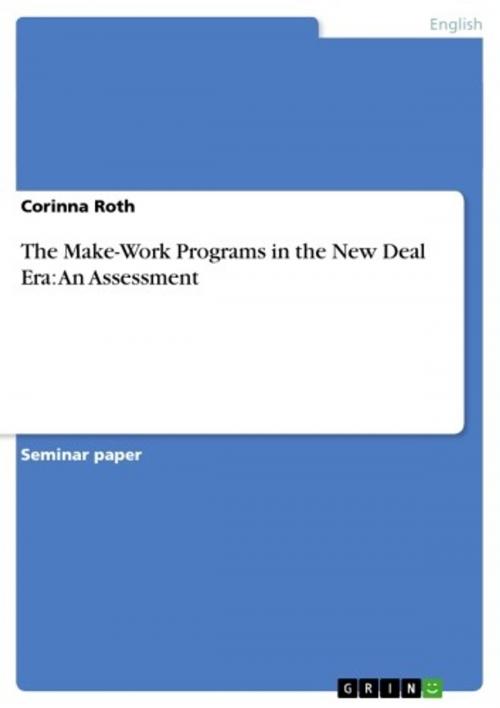The Make-Work Programs in the New Deal Era: An Assessment
Nonfiction, Reference & Language, Study Aids, ESL, Foreign Languages| Author: | Corinna Roth | ISBN: | 9783638869317 |
| Publisher: | GRIN Publishing | Publication: | December 1, 2007 |
| Imprint: | GRIN Publishing | Language: | English |
| Author: | Corinna Roth |
| ISBN: | 9783638869317 |
| Publisher: | GRIN Publishing |
| Publication: | December 1, 2007 |
| Imprint: | GRIN Publishing |
| Language: | English |
Seminar paper from the year 2006 in the subject English Language and Literature Studies - Culture and Applied Geography, grade: 1,5, Technical University of Chemnitz, course: Hauptseminar: Comparative Studies - the Interwar Period in Britain and the USA, 15 entries in the bibliography, language: English, abstract: In the beginning, Roosevelt had to face a widespread economic disaster which covered all sectors: the banking had collapsed so that most people lost all their money and lifetime savings; the agriculture, more than the other sectors, suffered from the depression by overproduction and falling prices; and the industry urgently required recovery. First of all, Roosevelt proclaimed 'a three-day 'bank holiday'' and shortly after that the Emergency Banking Relief Act (EBRA) to restore the collapsed banking. The Agricultural Adjustment Act(AAA) was an attempt to solve the agricultural difficulties, and the recovery of the industry should be achieved by the National Industrial Recovery Act (NIRA). The resulting most predominant and urgent problem in all sectors was increasing unemployment and impoverishment which Roosevelt attacked by varying make-work programs. He was aware of the alarming dimensions of this problem. Regarding this fact, taking the jobless to work was Roosevelt's most important concern and as it was the basis of the well-being and prosperity of the nation it had priority over all other problems. What sets Roosevelt apart from the other presidents was his faith in the future and his ability to convince the American people that they must also believe in the future to regain a normal way of life. Roosevelt's work relief programs, especially during the First Hundred Days, have repeatedly been debated up to this day. There have always been controversial discussions about the effects and failures. For all that reasons, in my paper I will concentrate on the make-work programs and examine its positive and also negative effects. In the first part I will shortly outline the situation before Roosevelt's presidency and his election pledge, and I will generally define the term. Further, I will have a closer look on the chronologically ordered programs of the First New Deal. I am going to define each measure, demonstrate the effects, achievements, and also the negative side effects respectively criticism. The second part focused the make-work measures of the Second New Deal in a similar way. I will give an overview of the regular earnings in contrast to the earnings under work relief and WPA in a table. My intention is to give an assessment of the positive and negative results and achievements. I will examine to what extent Roosevelt was able to fulfil his promise and whether the programs were successful on a long term basis.
Seminar paper from the year 2006 in the subject English Language and Literature Studies - Culture and Applied Geography, grade: 1,5, Technical University of Chemnitz, course: Hauptseminar: Comparative Studies - the Interwar Period in Britain and the USA, 15 entries in the bibliography, language: English, abstract: In the beginning, Roosevelt had to face a widespread economic disaster which covered all sectors: the banking had collapsed so that most people lost all their money and lifetime savings; the agriculture, more than the other sectors, suffered from the depression by overproduction and falling prices; and the industry urgently required recovery. First of all, Roosevelt proclaimed 'a three-day 'bank holiday'' and shortly after that the Emergency Banking Relief Act (EBRA) to restore the collapsed banking. The Agricultural Adjustment Act(AAA) was an attempt to solve the agricultural difficulties, and the recovery of the industry should be achieved by the National Industrial Recovery Act (NIRA). The resulting most predominant and urgent problem in all sectors was increasing unemployment and impoverishment which Roosevelt attacked by varying make-work programs. He was aware of the alarming dimensions of this problem. Regarding this fact, taking the jobless to work was Roosevelt's most important concern and as it was the basis of the well-being and prosperity of the nation it had priority over all other problems. What sets Roosevelt apart from the other presidents was his faith in the future and his ability to convince the American people that they must also believe in the future to regain a normal way of life. Roosevelt's work relief programs, especially during the First Hundred Days, have repeatedly been debated up to this day. There have always been controversial discussions about the effects and failures. For all that reasons, in my paper I will concentrate on the make-work programs and examine its positive and also negative effects. In the first part I will shortly outline the situation before Roosevelt's presidency and his election pledge, and I will generally define the term. Further, I will have a closer look on the chronologically ordered programs of the First New Deal. I am going to define each measure, demonstrate the effects, achievements, and also the negative side effects respectively criticism. The second part focused the make-work measures of the Second New Deal in a similar way. I will give an overview of the regular earnings in contrast to the earnings under work relief and WPA in a table. My intention is to give an assessment of the positive and negative results and achievements. I will examine to what extent Roosevelt was able to fulfil his promise and whether the programs were successful on a long term basis.















